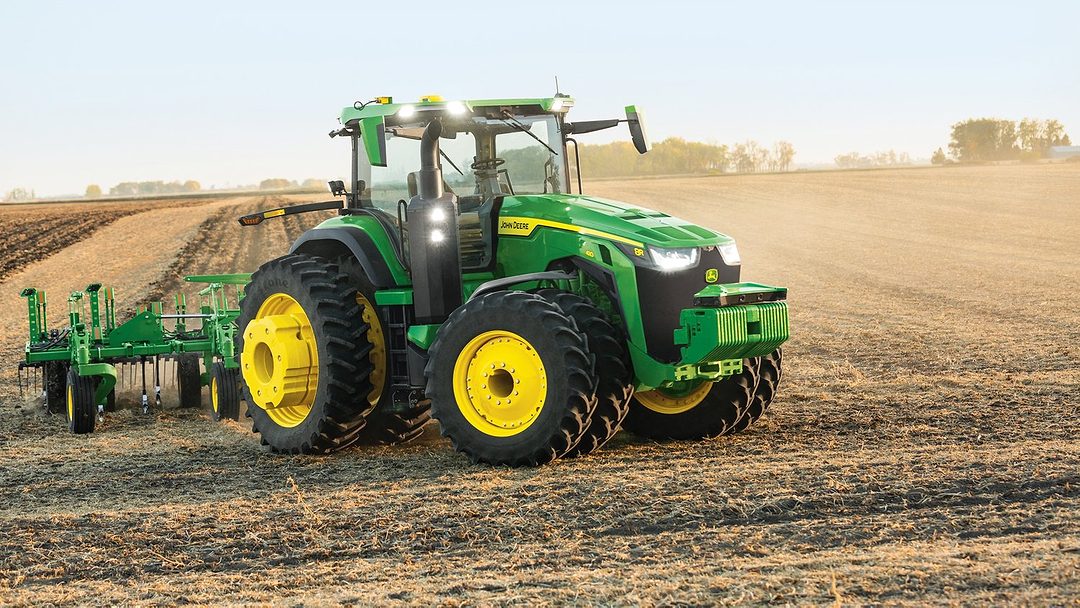Deere & Co. is taking a page from Apple and other tech companies' playbooks by combining its iron with software and subscription-based models to increase its revenue growth.
During a company event focused on autonomy and tech, Jorge Heraud, Deere's vice president of automation and autonomy, said Deere is set up to become a world-leading robotics and artificial intelligence company.
Deere and other OEMs are developing autonomous equipment and software harvesting a new kind of crop — data. Massive amounts of data translates into recurring revenue, something that companies like Apple have long enjoyed.
"The more technology we can develop to allow farmers to get productivity out of their land without having to spend so much money on fertilizer and inputs, the better off everybody is," Julian Sanchez, Deere's director of emerging technology, told Reuters.
Deere's strategy to scale its tech products is in the spotlight after its stock dropped 14% May 20 following a quarterly revenue miss — the biggest drop for Deere in 14 years, according to Reuters. Deere is placing its bet in autonomous machinery as a moneymaker in the future. Its autonomous 8R tractor is priced at $500,000, but autonomy will be sold separately and likely as a subscription service.
While Deere has not outlined what autonomy would mean for its bottom line, last fall U.S. automaker General Motors Co. said it was targeting up to $25 billion in software-driven services by 2030 and projected that its Cruise self-driving unit could achieve $50 billion in annual revenue within 6 years.
The recurring revenue model can be economically favorable to heavy machinery manufacturers, said Michael Staebe, a Bain & Company partner focused on machinery. In Deere’s case, using a subscription model by either selling or leasing its driverless tractor can result in higher margins.
"After expenses, every incremental dollar falls straight to the bottom line," Edward Jones analyst Matt Arnold told Reuters. "We would expect it to be an attractive offering to farmers given the efficiency it offers them, and lucrative to Deere."
While farmers have been wary about OEMs and suppliers profiting off their data and data security, manufacturers believe it will be easier to sell farmers on such investments as farmers face economic pressures like labor shortages, high input prices and needing to produce more with less. Huge amounts of agronomic data takes the guesswork out of planting and input rates, saving farmers money.
"Everybody in the industry is much more data-focused than we have ever seen them," said Michael Boehlje, a professor at Purdue University. "(Companies) can do profit projections by geographic space in fields. That takes you to a different level of thinking and analysis.
In 2020, Deere acquired Harvest Profit, a farm profitability software company that has been integrated into the John Deere Operations Center. The platform stores and lets farmers access their machine data from the cloud. Sanchez said automating high-horsepower farm machinery is just the beginning for Deere, as the next step will be using satellite imagery and soil data to make planting decisions..
"When I look at what precision ag has done for our operations and what we can accomplish in a day's time compared with 10 to 20 years ago, it's so much easier," said Jeremy Jack, a row crop farmer in Mississippi and chief executive of Silent Shade Planting Co.
Related Content
[Technology Corner] Autonomy to Play ‘Significant Role’ in Deere’s Target Recurring Revenue Goal
Deere: Fully Autonomous Corn, Soybean Production System Planned by 2030
[Podcast] Deere’s Autonomous Tractor & Mainstreaming Autonomy with Scott Shearer



![[Technology Corner] Ag Leader Introduces RightPath at National Farm Machinery Show](https://www.precisionfarmingdealer.com/ext/resources/2025/02/14/Ag-Leader-Introduces-RightPath-at-National-Farm-Machinery-Show.png?height=290&t=1739563569&width=400)


